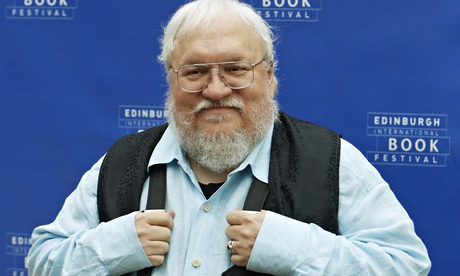
The landmark fantasy series A Song of Ice and Fire is – in part – a response to the Tolkien imitators of the ’70s and ’80s, said author George R R Martin during his appearance at the Edinburgh International Book Festival. A jovial presence at two warmly-received events during the festival’s first week, Martin said that, as a long-term fan of mixing genres, he wanted to blend the world-building grandeur of Lord of the Rings with the gritty realism of the best historical fiction. And although the success of HBO’s TV adaptation has brought him more recognition than he ever hoped to achieve, he still wishes that people would go back and discover the 20 years’ worth of work which came before Game of Thrones; he is, he said, “an overnight success that took 40 years.”
Martin spoke at length about the influence of British and French history on his writing, as well as some particularly infamous events from Scotland’s past, including the Glencoe massacre and the ‘Black Dinner‘ of 1440. All history, he said, is bloody, which is why his stories call for a measure of gore and horror, but he remains astonished and slightly perturbed that the sexual content of his books is still considered more controversial than their violent elements. Asked by one fan about his thoughts on moral absolutism, Martin replied that he writes his characters to illustrate that people can never be morally black-and-white, but only different shades of grey, and that this is just one of the issues with which he wants to challenge his readers. Of all these morally grey characters he admitted that Tyrion was his favourite, but that he enjoys writing all of them, as they are all ultimately shaped by his own personality and experience; “all characters needs motivations,” he said, “especially the bad ones!”
Armed with an incredible imagination which helped him escape his humdrum New Jersey childhood, Martin’s career started early with the writing of stories which he would sell to his school friends. His first published words were in the letters column of Marvel’s Fantastic Four in the early 1960s, and despite the success he enjoyed in the 1970s with his Hugo and Nebula-nominated short stories and early novels, the commercial failure of his fourth novel – 1983’s The Armageddon Rag – led him to a make a move into screenwriting. The experience was, on the whole, a positive one, and helped him develop his approach to dialogue and structure, but he soon felt a desire to return to writing prose fiction, and in 1991 began work on the book that would become Game of Thrones. The rest, as they say, is history, and despite the overwhelming popularity of the TV adaptation of his work, Martin insists that it has no effect on how he writes characters he’s been living with for over 20 years. He has some involvement in the show, and indeed recognised early on that television, rather than movies, was the best way to adapt his novels, but the books, as he put it, “are my baby.” With two books still to be published in the Song of Ice and Fire series, does he know how it’s all going to end? He’s known all the main story points, he said, pretty much since day one, but there are a lot of smaller strands that he’s yet to properly work out. Asked if he found writing the series an enjoyable experience, Martin smiled and said, “I’ll enjoy it when it’s done.”
